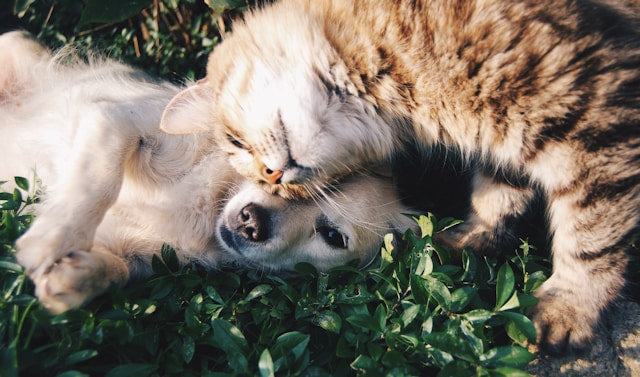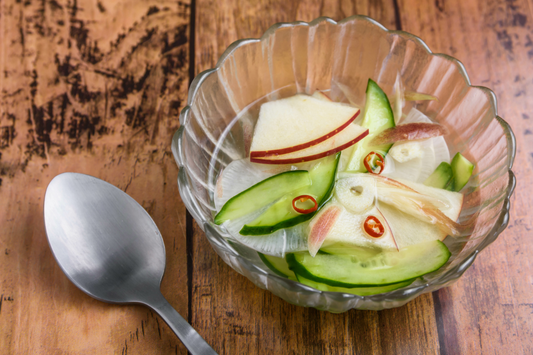We want our beloved pets to stay healthy for a long time. Recently, we often hear the word "intestinal environment" in relation to pet health.
Just like humans, it is known that pet health and immune systems are greatly affected by the balance in the intestines. Therefore, in order to maintain the health of pets and prevent illness, it is said that "intestinal activity" that regulates the intestinal environment is essential.
In this article, we will introduce what "intestinal activity" is, its benefits, and how to improve your pet's intestinal environment.
What is intestinal health for pets? Explaining the differences between intestinal health for humans

Have you ever heard of the term intestinal flora? It is also called intestinal flora.
The intestinal flora plays many important roles in digestion, nutrient absorption, immune function, etc. A healthy intestinal flora prevents the growth of harmful microorganisms, efficiently absorbs nutrients, and supports the immune system.
If your intestinal flora is disrupted, you run the risk of experiencing health problems such as indigestion, diarrhea, and constipation.
The main causes of intestinal disorders in pets are improper diet, stress, use of antibiotics, etc. In particular, a pet's diet has a large impact on their health, and if the nutritional balance is disrupted, the intestinal flora is also easily disrupted.
By improving your intestinal environment through intestinal activity, you can maintain a healthy body.
However, some people may wonder what they should do to improve their intestinal health.
Intestinal health refers to activities and dietary improvements that improve the intestinal environment. For example, taking probiotics and prebiotics can help maintain a healthy intestinal flora. It is also important to incorporate a diet rich in dietary fiber and stress management into intestinal health.
What is the difference in pets' intestinal health?
Although improving the intestinal flora is the same for both pets and humans, the diet and methods are slightly different. Here are four points that are different from human intestinal activity.
① Meals
Unlike humans, pet owners need to consider nutritional balance when it comes to their pet's diet. Humans can decide their own meals and get the nutrients they need, but pets need to eat the food their owners give them.
Therefore, to keep their pets healthy, owners need to consider nutrition and control their diet.
2) Psychological stress
It is also important to control psychological stress in order to improve your pet's intestinal environment. Neither humans nor pets can create a healthy intestinal environment when they are under stress.
Unlike humans, pets have difficulty changing their environment or relieving stress on their own, so owners need to understand their pets' stress levels and psychological state and create the right environment for them.
So what specifically can you do to improve your pet's intestinal health?
Here are some specific things you can do to improve your pet's intestinal environment.
What can I do to improve my pet's intestinal health?

Now we know that improving intestinal flora is important for our pet's health, but what exactly should we do?
Here we will introduce some effective ways to improve your pet's intestinal health that you can incorporate into your daily life.
Tip 1: A balanced diet
First, it is important to feed your pet a balanced, nutritious diet. Just like humans, pets need the right amount of protein, fat, carbohydrates, vitamins, and minerals. Commercial pet foods contain a good balance of these nutrients, but it is important to choose your pet's food with health in mind. Choosing a diet made with natural ingredients with few additives and artificial ingredients is also a way to promote intestinal health.
Point 2: Increase good bacteria (probiotics)
When you hear about improving intestinal environment, some people may think of lactic acid bacteria or bifidobacteria, and these are exactly what probiotics are.
It is said that consuming probiotics is a good way to improve your pet's intestinal environment.
These strains migrate into the intestines and suppress the growth of harmful microorganisms, restoring intestinal balance. Simply put, it increases the number of good bacteria.
Probiotics help keep your pet's intestinal flora healthy, improving digestive and immune function.
There are also probiotics available in commercial supplements and certain pet foods.
Tip 3: Intake of dietary fiber (prebiotics)
Prebiotics are also important for intestinal health.
Prebiotics are dietary fiber. Feeding your pet foods rich in dietary fiber can help improve their intestinal environment. It is a good idea to give your pet vegetables, fruits, and whole grains along with their food.
Tip 4: Moderate exercise
We tend to focus only on diet, but moderate exercise and stress management are also important for intestinal health.
Exercise improves digestion and helps keep the intestinal flora healthy. Stress can also have a negative effect on the intestinal flora, so it is also important to provide a relaxing environment.
Tip 5: Regular health checks
Don't forget to conduct regular health checks and consult with your veterinarian. By checking your pet's health and getting advice if necessary, you can maximize the benefits of intestinal health.
Your pet's intestinal health can start with simple things like diet, supplements, exercise, and stress management. When thinking about your pet's health, why not start by thinking about intestinal health that you can do on a daily basis? Try intestinal health through diet, supplements, exercise, etc. as part of your daily care and health promotion.
Kestose is also effective for pets' intestinal health
Among the products developed to support the health of pets, one that has attracted particular attention is Kestose.
Kestose is a type of oligosaccharide that has a slightly sweet taste similar to sugar. It is popular for humans to easily ingest probiotics by mixing it with yogurt or coffee.
Kestose is also a great product for helping to regulate and keep your pet's intestinal flora healthy. Let's take a closer look at its effective ingredients and benefits.
First, the probiotics in kestose promote healthy gut flora.
Probiotics may sound a little difficult to understand, but a typical example is lactic acid bacteria.
Probiotics work by increasing the number of good bacteria in the intestines and suppressing the growth of harmful microorganisms, thereby helping to maintain a healthy intestinal environment for your pet.
Consuming probiotics such as lactic acid bacteria is beneficial not only for humans, but also for the intestinal health of pets such as dogs and cats.
Kestose also contains prebiotics.
Prebiotics are dietary fibre that serves as a source of nutrition for intestinal bacteria.
Consuming prebiotics helps maintain healthy intestinal flora and supports the health of your pet.
Kestose also contains enzymes that aid in digestion, helping to break down food and absorb nutrients more efficiently, helping your pet get more nutrients from their diet and provide the energy they need to stay healthy.
Additionally, kestose contains ingredients that have anti-inflammatory properties. Inflammation can be caused by an overactive immune system, which can have a negative impact on your pet's health. The anti-inflammatory properties of kestose can help keep your pet's immune system healthy and reduce inflammation.
As mentioned above, Kestose is an effective product that supports the health of pets in many ways. Various ingredients such as probiotics, prebiotics, digestive enzymes, and anti-inflammatory properties improve the intestinal environment and support the health of your pet.
Nakaya Shoten's Kestose can also be kept as a pet!
Nakaya Shoten's Kestose is made up of 100% kestose, the smallest unit of oligosaccharide, which is made up of three sugars.
It selectively increases the "bifidobacteria," "lactic acid bacteria," and "butyric acid bacteria" present in the intestines, which are necessary for maintaining health, and specifically increases the short-chain fatty acids, especially "acetic acid" and "butyric acid," so it can also be used by those who want to start improving their pet's intestinal health.
*Kestose itself is a type of oligosaccharide extracted from vegetables and fruits, so there is no problem in giving it to pets, but giving too much may cause loose stools.
Please try a small amount at a time, using the following as a guide.
-----------------------------------
・Weight less than 10kg → 1g kestose
・Weight 10-20kg → 2g kestose
・Weight over 20kg → 3g Kestose
*The degree is a guideline.
-----------------------------------
References)
https://rd.bfsci.co.jp/rtheme/247/
https://www.fujita-hu.ac.jp/news/j93sdv000000rxg6.html
Why not try Kestose to easily support your pet's health?
We also offer subscription services that will automatically deliver your order when you run out.
Click here to purchase Kestose subscription
Related articles:
It's not just humans who need an healthy intestinal environment! Intestinal health has also been shown to be effective for beloved dogs and cats.
Why not start by improving your pet's intestinal health?
How to cure atopic dermatitis in dogs | How to improve naturally with dog food and kestose


![[Monthly subscription] Kestose (3g x 30 sachets) Intestinal environment prebiotic oligosaccharide](http://aidaya.shop/cdn/shop/files/11_84177fe6-a9b2-436e-9d65-c2e970fa88c1.png?v=1756813170&width=533)
![[Monthly subscription] Kestose (3g x 30 sachets) x 2 sets Intestinal environment prebiotic oligosaccharide [Free shipping]](http://aidaya.shop/cdn/shop/files/12_b0502f55-0a97-4613-b661-389adc8bddf7.png?v=1756813168&width=533)
![[Monthly subscription] Kestose (3g x 30 sachets) x 3 sets Intestinal environment prebiotic oligosaccharide [Free shipping]](http://aidaya.shop/cdn/shop/files/13_a64c499a-e4be-4527-8cf5-204f1f8e5895.png?v=1756813169&width=533)
![[Monthly subscription] Kestose (3g x 30 sachets) x 4 sets Intestinal environment prebiotic oligosaccharide [Free shipping]](http://aidaya.shop/cdn/shop/files/14_20a70cb9-ee50-4648-8d8c-12db833b463e.png?v=1756813166&width=533)


